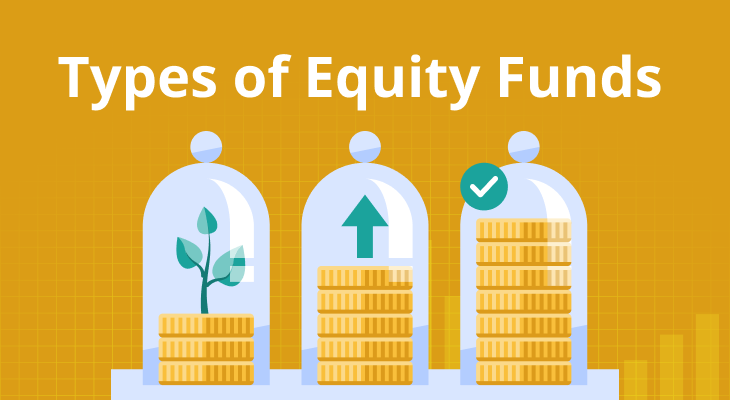Types of Equity Funds

If you’re seeking long-term capital appreciation and potential growth, then equity funds are probably the right investment option for you. These funds mainly invest in stocks or equities of companies across various sectors and market capitalisations. There is a large array of various types of equity funds that can fit different kinds of investment objectives and risk tolerance levels. In this blog, we will explore the different types of equity funds available in mutual funds , highlighting their characteristics and benefits. So, let’s get right to it.
Equity Funds Based on Market Capitalisation
Equity funds can be categorised based on the market capitalisation of the companies in which they invest. Market capitalisation refers to the total value of a company’s outstanding shares in the stock market.
- Small Cap Funds Small-cap funds invest in stocks of companies with smaller market capitalizations. These companies are typically considered to have high growth potential but may also carry higher risk. Small-cap funds aim to generate substantial returns over the long term by identifying promising smaller companies. In India, small-cap companies are those which have a total market capitalisation of less than Rs. 5,000 Cr.
- Mid Cap Funds Mid-cap funds invest in stocks of companies with moderate market capitalizations. These companies are often in a phase of growth and expansion, striking a balance between potential growth and relative stability. Mid-cap funds aim to capture the growth opportunities offered by such companies. Mid-cap companies have a market capitalisation between Rs 5,000 Cr and Rs 20,000 Cr.
- Large Cap Funds Large-cap funds invest in stocks of companies with significant market capitalizations. These companies are typically well-established and have a proven track record. Large-cap funds prioritise stability and aim to provide steady returns over the long term. They are considered relatively less risky compared to small-cap and mid-cap funds. Companies with a market capitalisation of Rs 20,000 Cr. or above fall under the large-cap category.
- Flexi Cap Or Multi Cap Funds Flexi-cap or multi-cap funds provide the flexibility to invest across companies of different market capitalisations. These funds allocate their investments based on the fund manager’s assessment of market conditions and opportunities. Flexi-cap funds provide diversification and the potential for both growth and stability.
Equity Funds Based on Investment Strategies
Equity funds can also be categorised based on the investment strategies employed by fund managers to achieve their objectives.
- Value Funds These types of equity funds follow a value investing approach, seeking to identify undervalued stocks in the market. These funds invest in companies that are believed to be trading below their intrinsic value and have the potential for future appreciation.
- Growth Funds Growth funds focus on investing in companies that demonstrate strong growth potential. These funds target companies with high earnings growth rates and invest in sectors expected to outperform the broader market.
- Sector Funds Or Thematic Funds Sector funds concentrate their investments in specific sectors or industries. These funds aim to capitalise on the growth prospects of a particular sector or industry. For example, sector funds may focus on technology, healthcare, or energy sectors. These types of equity funds can also be theme-based such as rural development, green energy, etc.
Equity Funds Based on Tax Deduction
Equity-Linked Savings Scheme (ELSS)
ELSS funds are a type of equity mutual fund that offer tax benefits of up to Rs. 1.5 Lakhs per financial year, under Sec 80C of the Income Tax Act. These funds have a lock-in period of three years and provide investors with the opportunity to save taxes while participating in the potential growth of the equity market.
Benefits of Equity Funds
Now that you know the different types of equity funds, here are some of the benefits of investing in them.
- Long-Term Capital Appreciation: Equity funds have the potential to deliver long-term capital appreciation, outperforming other traditional investment avenues.
- Diversification: By investing in a portfolio of stocks across different sectors, equity funds provide diversification, reducing the concentration risk associated with individual stocks.
- Professional Fund Management: Equity funds are managed by experienced fund managers who conduct thorough research and analysis to make informed investment decisions on behalf of investors.
- Liquidity: Equity funds offer high liquidity, allowing investors to buy or sell their units on any business day, providing easy access to their investments.
Risks Involved and Factors to Consider
Although equity funds provide a host of benefits, there are also some risks that you need to consider to make an informed financial decision.
- Market Volatility: Equity funds are subject to market fluctuations and can experience periods of volatility. Investors should be prepared for short-term price fluctuations and have a long-term investment horizon.
- Risk Tolerance: Consider your risk tolerance and investment objectives when choosing equity funds. Higher-risk funds may offer the potential for higher returns but also carry greater volatility.
- Fund Performance: Evaluate the historical performance of the fund, including its consistency, to assess its track record and potential for future growth.
In Summation
Equity funds offer a range of options to suit different investment needs and risk appetites. By understanding the types of equity funds available, investors can make informed decisions aligned with their financial goals. Whether you choose small-cap, mid-cap, large-cap, flexi-cap, value, growth, sector funds, or opt for tax-saving ELSS funds, it is important to assess your risk tolerance, investment horizon, and seek professional advice when building your equity portfolio. With careful consideration and a long-term perspective, equity funds can play a crucial role in wealth creation and achieving financial objectives.




